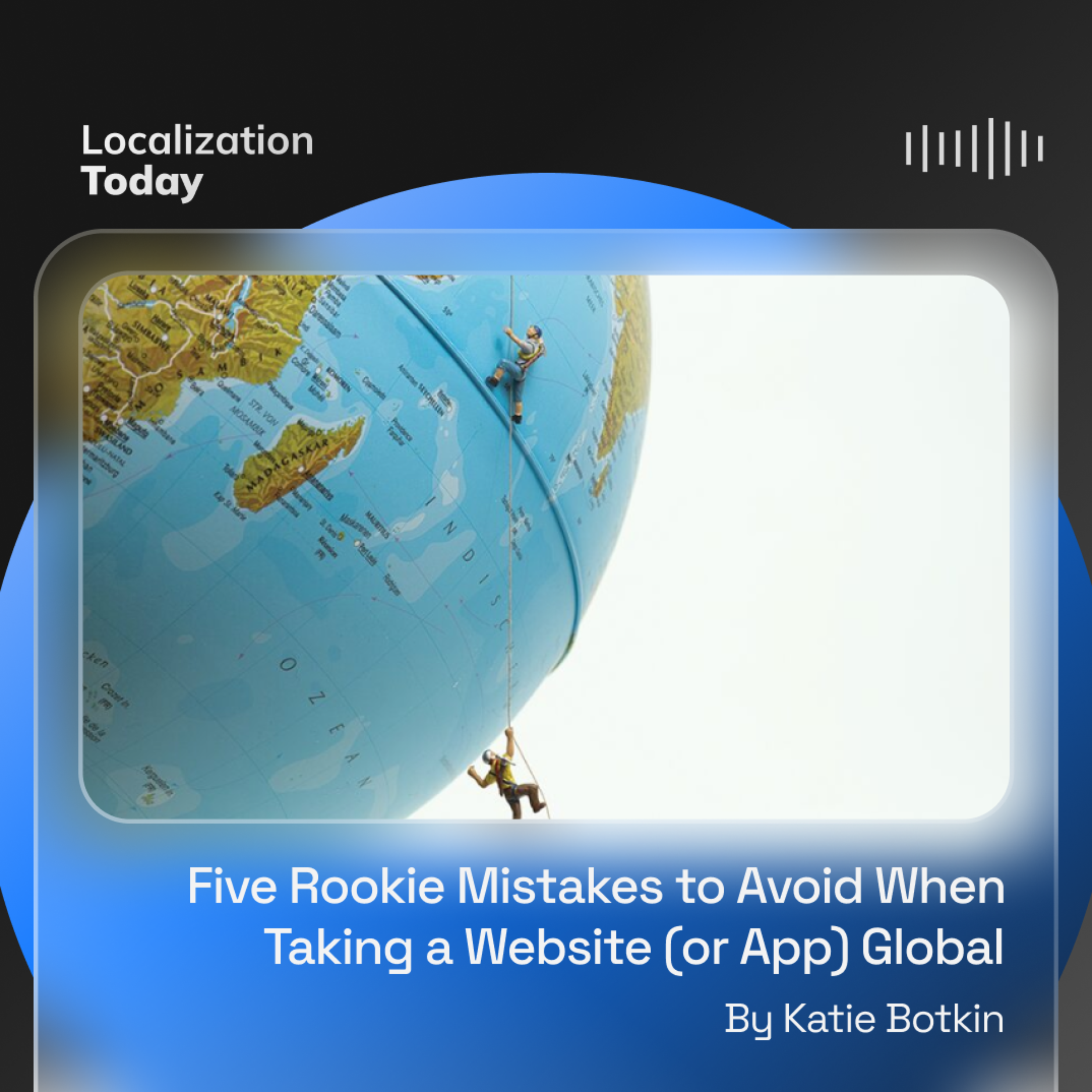Episode Transcript
[00:00:06] Speaker A: This is localization today, a podcast from multilingual media covering the most relevant daily news in the language industry.
[00:00:15] Speaker B: Across industries in the US, there is increasing awareness of the importance of language access services to ensure that consumers with limited english proficiency can access services like healthcare, banking, and education just as easily.
[00:00:30] Speaker C: As native english speakers do. One in five people speak a language.
[00:00:35] Speaker B: Other than English at home, and some areas of the US have become increasingly.
[00:00:39] Speaker C: Diverse in terms of languages spoken. This diversity underscores the need for businesses.
[00:00:45] Speaker B: And organizations to maintain compliance with language.
[00:00:48] Speaker C: Access laws and create and implement a language access plan. Doing so will help you enhance customer.
[00:00:54] Speaker B: Service, reach more customers, connect to the.
[00:00:57] Speaker C: Community, and realize a competitive advantage. Here's what you need to know about.
[00:01:02] Speaker B: Legal rights and protections afforded to consumers and the factors you should consider in.
[00:01:06] Speaker C: Putting together a realistic language access plan.
Understanding consumers legal rights and protections laws.
[00:01:13] Speaker B: And regulations vary by state and are constantly evolving, but if your organization receives federal funding, you may be legally required to provide language services to nonenglish speakers.
[00:01:24] Speaker C: And those who are deaf or hard of hearing. Key federal laws surrounding language access include.
[00:01:30] Speaker B: Title six of the Civil Rights act of 1964 requires recipients of federal financial assistance to take reasonable steps to make.
[00:01:39] Speaker C: Their programs, services, and activities accessible by people with LEP. Executive Order 13166 builds on title six.
[00:01:48] Speaker B: By reinforcing existing requirements for recipients of.
[00:01:51] Speaker C: Federal financial assistance to provide meaningful access to LEP persons. Americans with Disabilities Act ADA requires organizations.
[00:02:01] Speaker B: To ensure that people who are deaf or hard of hearing have the right.
[00:02:04] Speaker C: Tools and support to communicate effectively.
[00:02:07] Speaker B: Section 1557 of the Affordable Care act prohibits discrimination on the grounds of national origin.
[00:02:14] Speaker C: This protection includes languages spoken even if.
[00:02:18] Speaker B: Your organization is not covered under federal requirements for spoken languages, you still need to abide by any state laws.
[00:02:25] Speaker C: In addition to the Ada, lawsuits involving.
[00:02:29] Speaker B: Lack of language assistance generally boil down to a few key reasons not providing interpreting services when needed, use of ad hoc interpreters assumptions about language concordance based on the patient's appearance, and lack of training, both on internal language access policies.
[00:02:45] Speaker C: And for servicing patients who are deaf. Creating a realistic language access plan a.
[00:02:51] Speaker B: Language access plan can help ensure that you're meeting the letter as well as the spirit of the law in serving.
[00:02:56] Speaker C: All your customers, regardless of the language they speak. While there are some common components, your.
[00:03:02] Speaker B: Language access plan will be unique to your organization.
[00:03:06] Speaker C: It needs to reflect your customer base.
[00:03:08] Speaker B: Goals and workflows, or else your team.
[00:03:11] Speaker C: Simply won't embrace it.
[00:03:13] Speaker B: A few key steps can help you get started creating a realistic plan your employees can get behind. Get to know your customer what languages.
[00:03:21] Speaker C: Do you need to support? Do people prefer to communicate with your business via phone, social media, text, WhatsApp, or another channel?
Opening the door to conversations, whether formal.
[00:03:34] Speaker B: Or informal, through surveys, questionnaires, polls, or another vehicle with your LEP customer base is the first step in ensuring that.
[00:03:43] Speaker C: Your plan sufficiently meets their needs.
You also need to ensure that you.
[00:03:47] Speaker B: Are tracking any data collected so your employees have easy visibility into when, how.
[00:03:53] Speaker C: And for whom an interpreter is needed. Get feedback from staff.
[00:03:57] Speaker B: Your employees can tell you whether the.
[00:03:59] Speaker C: Questions you are asking your customers are working. If you're asking about language preferences on.
[00:04:04] Speaker B: A form but people are leaving it blank, it could be as simple as.
[00:04:08] Speaker C: Moving the question to a more prominent spot. Staff members can also provide valuable insight.
[00:04:14] Speaker B: Into how language services are delivered. For example, with a scenario in which phone conversations are challenging, offering video or.
[00:04:22] Speaker C: Face to face interpretation is imperative. Assess any resource gaps based on what.
[00:04:28] Speaker B: You discover from customers and staff. Are there any gaps you need to fill, such as hiring bilingual employees or getting tools to serve the deaf and.
[00:04:36] Speaker C: Hard of hearing community? Are there materials that will make it.
[00:04:40] Speaker B: Easier for your teams to connect customers with interpreters, such as brochures, posters or.
[00:04:45] Speaker C: Stickers on phones with instructions for accessing language support? Can you benefit from or are you maximizing your relationship with a language service provider? Get the word out.
[00:04:57] Speaker B: Ensure that everyone in your organization understands what language services you offer, how to.
[00:05:02] Speaker C: Access them, and when to use them. This will require training and retraining staff on the language access plan. When you're done circulating your language access.
[00:05:12] Speaker B: Plan internally, it's time to turn your focus outward, ensuring that the communities you serve know how much you care about.
[00:05:19] Speaker C: Communicating with them in their preferred language. Post notifications about available interpreter services in.
[00:05:26] Speaker B: Strategic locations, like on your front door, on your website, and in marketing materials.
[00:05:32] Speaker C: To get the word out that all customers are welcome.
Revisit and revise annually.
[00:05:37] Speaker B: Creating a language access plan isn't a.
[00:05:40] Speaker C: Set it and forget it endeavor. Write into your plan directives to audit.
[00:05:44] Speaker B: And revise the plan at set intervals and include details on the steps to.
[00:05:48] Speaker C: Reassess it and who should be involved. This will ensure that your plan evolves.
[00:05:53] Speaker B: Along with technology and your products, services.
[00:05:56] Speaker C: Processes, and customer base.
Your language access plan is not just.
[00:06:01] Speaker B: A set of guidelines, it's also a living testament to your dedication to serve all customers.
[00:06:07] Speaker C: By continually reassessing, adapting, and reaching out.
[00:06:11] Speaker B: To customers and employees, you can ensure that your organization is able to design and execute effective language access programs and stay on top of regulations and best practices.
[00:06:22] Speaker C: This article was written by Christian Quinlan, published on multilingual.com on December 16, 2023.
[00:06:30] Speaker A: Thank you for listening to localization today. To subscribe to multilingual magazine, go to multilingual.com subscribe.


